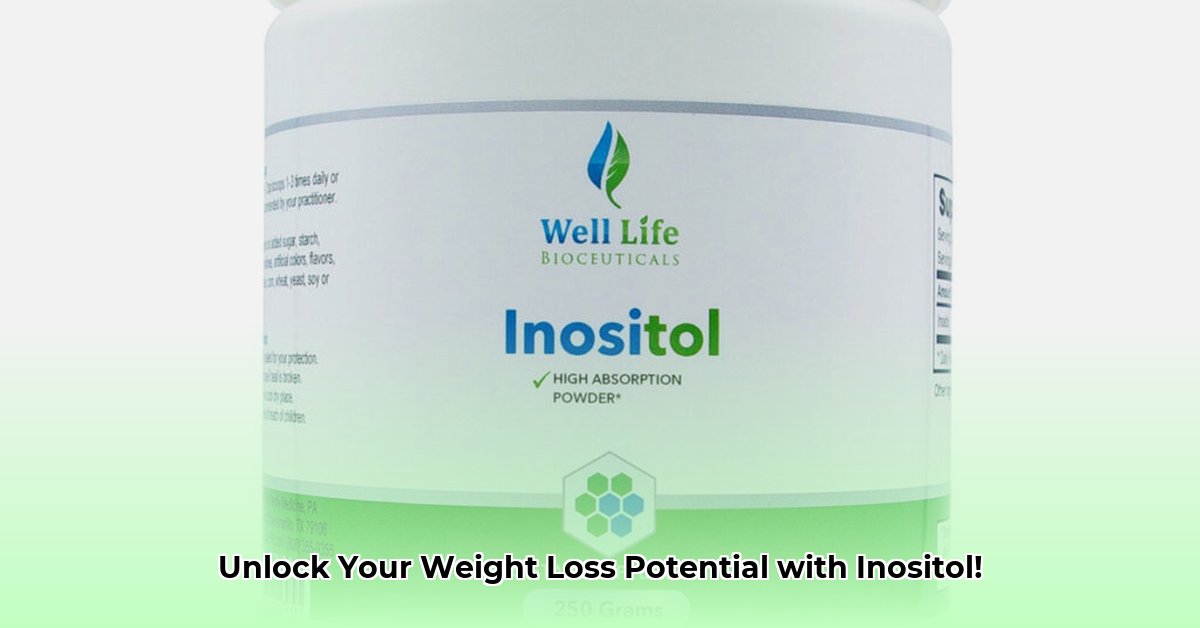
Inositol powder has gained popularity as a potential weight-loss aid. But does the science support the hype? This comprehensive review examines the evidence, exploring inositol's potential benefits, risks, and how to safely incorporate it into a weight-loss strategy.
Understanding Inositol and Its Potential Role in Weight Management
Inositol, specifically myo-inositol (MI), is a naturally occurring compound found in our bodies and various foods. It's not a new discovery, but research is increasingly exploring its potential health benefits, including its role in weight management. One key mechanism is its potential to improve insulin sensitivity.
Insulin is a hormone that helps your body use sugar for energy. Insulin resistance, a condition where your body doesn't use insulin efficiently, can lead to high blood sugar and increased fat storage, particularly around the abdomen. MI may enhance insulin sensitivity, potentially leading to better blood sugar control and reduced fat accumulation. However, it's critical to understand that this is a potential mechanism, not a guaranteed outcome. Inositol is not a standalone weight-loss solution.
Who Might Benefit Most from Inositol Supplementation?
While inositol shows promise for many, specific populations may experience more pronounced benefits. Studies suggest that individuals with:
Polycystic ovary syndrome (PCOS): PCOS is often associated with insulin resistance and weight gain. Inositol supplementation may help to improve insulin sensitivity and alleviate some PCOS-related symptoms contributing to weight management.
Metabolic syndrome: This cluster of conditions increases the risk of heart disease, stroke, and type 2 diabetes. Inositol's potential to improve insulin sensitivity could be beneficial in managing metabolic syndrome, indirectly supporting weight management.
However, it's crucial to remember that research is ongoing, and more studies are needed to confirm these observations and determine the exact extent of inositol's benefits in these and other populations.
How to Incorporate Inositol into Your Weight Loss Routine: A Step-by-Step Guide
Before starting any inositol supplementation, consult your doctor. They can assess your individual needs, potential interactions with medications, and help determine an appropriate dosage.
Consult your physician: This crucial first step ensures safety and helps personalize your approach. Your doctor can also advise if inositol is appropriate based on other pre-existing health conditions.
Start low, go slow: Begin with a moderate dose, generally between 1000–2000 mg of myo-inositol per day. Adjust the dose as recommended by your physician based on your response. Don't expect immediate results.
Combine with lifestyle changes: Inositol is not a replacement for a balanced diet and regular exercise. It’s a potential supportive factor, not a miracle cure. Focus on wholesome foods and regular physical activity.
Monitor your progress and report side effects: Track your weight and any changes in blood glucose levels (if relevant). Report any unusual side effects, such as gastrointestinal discomfort, to your physician.
Be patient and consistent: Weight loss takes time. Consistency with a comprehensive weight-loss plan is crucial.
Weighing the Pros and Cons: A Realistic Assessment
While inositol offers potential benefits, a balanced perspective is crucial.
Potential Benefits:
- May improve insulin sensitivity, leading to better blood sugar control.
- Potentially beneficial for individuals with PCOS and metabolic syndrome.
- May indirectly support weight management when combined with lifestyle changes.
Potential Drawbacks:
- More research is needed to confirm its effects on weight loss definitively.
- Results may vary significantly between individuals.
- May cause mild gastrointestinal side effects in some people.
- Not a standalone solution for weight loss; requires a comprehensive approach.
Dr. Emily Carter, PhD, RD, a registered dietitian and nutrition researcher at the University of California, Berkeley, notes, "While the potential benefits of inositol for weight management are promising, it's crucial to approach it as part of a larger health strategy, not a quick fix. It's not a magic bullet."
Inositol's Role in a Holistic Weight Management Approach
Inositol powder shows promise as a potential aid in weight management, particularly for those with insulin resistance or PCOS. However, managing weight successfully requires a comprehensive strategy. A holistic approach to weight loss that includes proper nutrition, regular exercise, stress management, and adequate sleep is essential for sustainable results. Inositol can be a helpful component of this broader strategy, but it's not a replacement for healthy lifestyle choices. Remember to consult your doctor before incorporating inositol or any supplement into your routine.